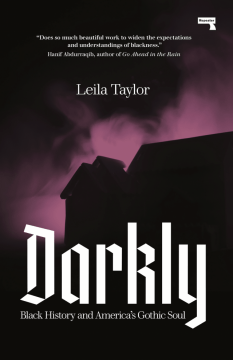Oscar Mardell at 3:AM Magazine:
 In Darkly, Leila Taylor offers a racially-minded revision of the Gothic canon, from Walpole to the present, with a particular focus on its American incarnations. But two things make this compendium a vital addition to the existing commentary. First is the fact that Taylor is no reductionist, and isn’t tempted, say, to dismiss the entire Gothic canon as irredeemably racist. Instead, Darkly makes a compelling and subtle argument: on the one hand, that the American Gothic is not simply a transplanting of an inherently European aesthetic, but a symptom of America’s (ongoing) legacy of racial oppression; on the other, that the American Gothic also promises a cure, a means of resisting that very oppression — that by allowing ourselves to be haunted by its texts, we can hope to terminate the legacy which produced them. Second is Taylor’s unapologetic use of the first person, her extensive reference to her subjective experience. That experience is directly related to the book’s argument: as Darkly makes clear, the legacy of racial oppression in America is something which Taylor has encountered — and continues to encounter — on a daily basis. But the inclusion of Taylor’s “I” here lends more than, say, credibility to her case (that case is already so tight, it would stand irrespective of who made it); it also ensures that Darkly, like the 43rd Capricho, is a self-portrait. By discussing how it feels for her to watch, say, Romero’s Night of the Living Dead — with its appropriations of Haitian folklore, and with the indiscriminate slaughter of the Black protagonist in its final scenes — Taylor forces us to participate in her experience. Darkly, then, to paraphrase something that Beckett once said of Joyce, is not just about the uncanny, it is uncanny.
In Darkly, Leila Taylor offers a racially-minded revision of the Gothic canon, from Walpole to the present, with a particular focus on its American incarnations. But two things make this compendium a vital addition to the existing commentary. First is the fact that Taylor is no reductionist, and isn’t tempted, say, to dismiss the entire Gothic canon as irredeemably racist. Instead, Darkly makes a compelling and subtle argument: on the one hand, that the American Gothic is not simply a transplanting of an inherently European aesthetic, but a symptom of America’s (ongoing) legacy of racial oppression; on the other, that the American Gothic also promises a cure, a means of resisting that very oppression — that by allowing ourselves to be haunted by its texts, we can hope to terminate the legacy which produced them. Second is Taylor’s unapologetic use of the first person, her extensive reference to her subjective experience. That experience is directly related to the book’s argument: as Darkly makes clear, the legacy of racial oppression in America is something which Taylor has encountered — and continues to encounter — on a daily basis. But the inclusion of Taylor’s “I” here lends more than, say, credibility to her case (that case is already so tight, it would stand irrespective of who made it); it also ensures that Darkly, like the 43rd Capricho, is a self-portrait. By discussing how it feels for her to watch, say, Romero’s Night of the Living Dead — with its appropriations of Haitian folklore, and with the indiscriminate slaughter of the Black protagonist in its final scenes — Taylor forces us to participate in her experience. Darkly, then, to paraphrase something that Beckett once said of Joyce, is not just about the uncanny, it is uncanny.
more here.
